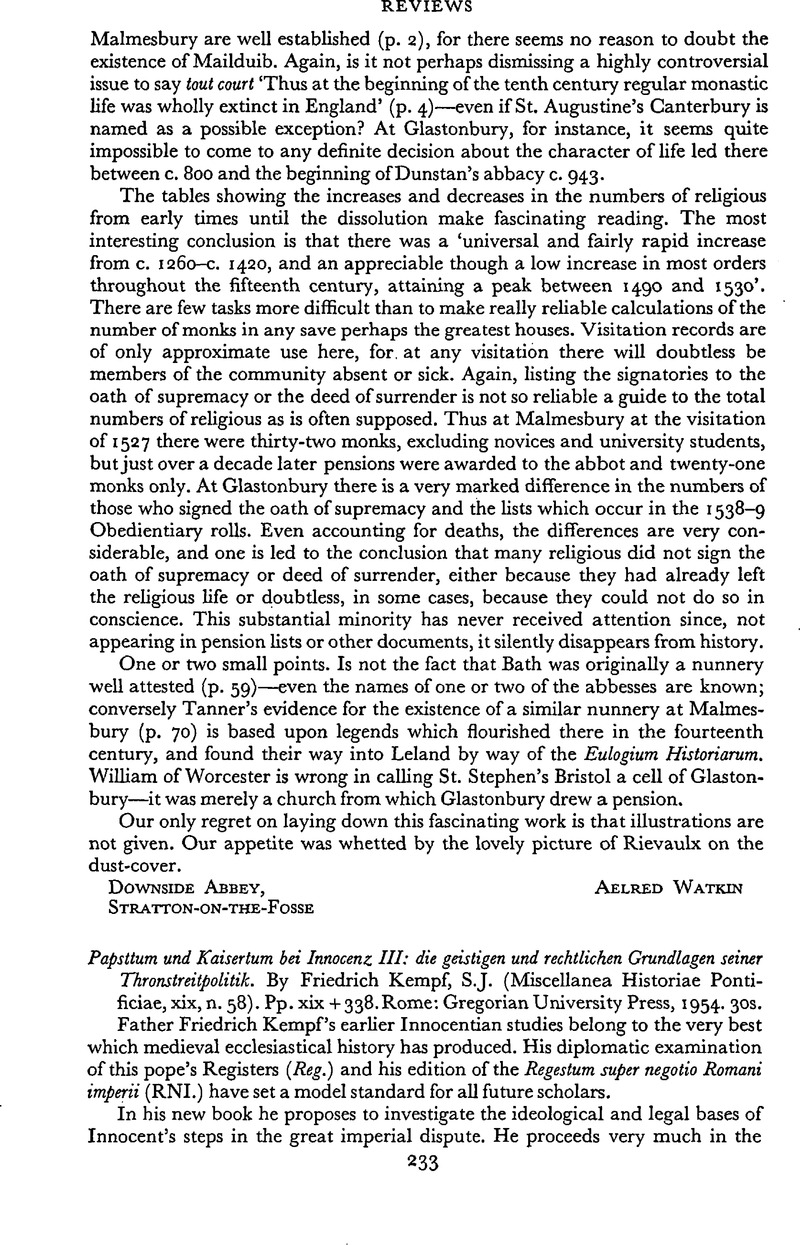No CrossRef data available.
Published online by Cambridge University Press: 25 March 2011

page 234 note 1 RNI. 81, 106, 160, 187. This title of Otto, to which Fr. Kempf does not attribute much importance, is reminiscent of the episcopal title: ‘Dei et apostolicae sedis gratia episcopus.’ Gervase of Tilbury interpreted Innocent correctly by telling Otto that it was through a papal favour that he ever became an emperor and that the Germans had no right to emperorship.
page 234 note 2 RNI. 65 to Otto: ‘Dominus ad imperii Romani fastigium te vocare disposuit’ and a few lines later: ‘Nos autem ad coronam imperii te disponimus evocare.’ The importance of this statement does not seem appreciated. The full weight of the statement in RNI. 179, to which Fr. Kempf often refers, emerges only when read together with the immediately preceding sun-moon allegory.
page 235 note 1 It is not usually noticed that Innocent writing to the German princes (RNI. 2) uses nominare when blaming them for their double election: ‘Duos vobis in reges presump seritis nominare’.
page 235 note 2 See RNI. 14 (‘Phillipum in imperaturam Romani solii rite et sollempniter elegimus’) and RNI. 61 (‘cum ad Romani imperii simus ascripti titulum’). Cf. also Philip's treaty with Philip Augustus of June 1198, hence two months before the royal coronation, in which his kingdom is designated as imperium nostrum. This view naturally excises the mediatory rôle of the pope.
page 235 note 3 Would the author also say that ‘pertinere’ in Novit.ille (Reg. vii. 42) is intentionally vague and undefined— ‘decernere de peccato, cuius ad nos censura sine dubitatione pertinet’? The important point about the provisio imperii should have been made in conjunction with Reg. i. 137: ‘Quamvis universa loca religiosa fovere ac diligere teneamur, illis tamen propensiorem curam impendere nos oportet, quae specialiter b. Petri juris existunt et ad nostram nullo mediante provisionem pertinent.’What the succinct phrase ‘imperium … pertinet’ meant was that the empire was the pope's negotium—this term is clearly derived from Gregory VII's terminology in his report about Canossa—because of its origin (principaliter) and purpose (finaliter), that is, because of its translation by the papacy from East to West for the purpose of protecting the Roman Church. For the way in which Innocent expressed a real claim to possession, cf., e.g., Reg. i. 361, 369, 375, 378, 426, etc. Cf. also Reg. i. 50.
page 235 note 4 The clause ‘in virtute obedientie districte praecipimus’ or ‘districte precipiendo mandamus’ inserted in RNI. letters to bishops relates to the obligations embodied in their episcopal oaths of obedience. That is why it is omitted in letters to secular princes and ‘mandare’ alone is used, and why, so as to be quite sure, some newly created bishops, such as Egbert of Bamberg, had to insert into their oath of obedience this: ‘Ego … profiteor me teneri ad obediendum, etiam super negotio Romani imperii mandatis domini papae’ (Reg. ix. 15). In some letters to secular princes not even ‘mandare’ is used and yet a penal sanction is attached, e.g., RNI. 156, 158. What else but an order is this?
page 236 note 1 In December 1203, hence four months after 24 August 1203, but with specific reference to the day, the pope (RNI. 92) calls Ottocar ‘Dux Boemie’, thereby clearly refusing to acknowledge the promotion. Cf. Fr. Kempf himself in his edition of the RNI., at RNI. 92, note 20.
page 236 note 2 On p. 147 the christianitas was ‘a highly ethereal thing’ without any juristic organism, whilst on p. 259 this christianitas was ‘not only a religious, but also a political-juristic organism,’ but on p. 261 it ‘presented a spiritual and religious rather than a concrete, political structure.’ Cf. also pp. 185, 304.
page 236 note 3 The influence of St. Bernard, Hugh of St. Victor and John of Salisbury should have been examined in detail. The latter's influence, hitherto overlooked, would merit close attention. Cf., e.g., RNI. 2, 18, Reg. i. 409, vii. 79 with Policraticus viii. 17, 18; also Reg. i. 171 and Policraticus iv. 3, etc. Honorius comes from St. Augustine, Canterbury, and not from Autun or Augsburg. Did Innocent really choose his name? Cf. Reg. ix. 136 and Gesta, cap. v.